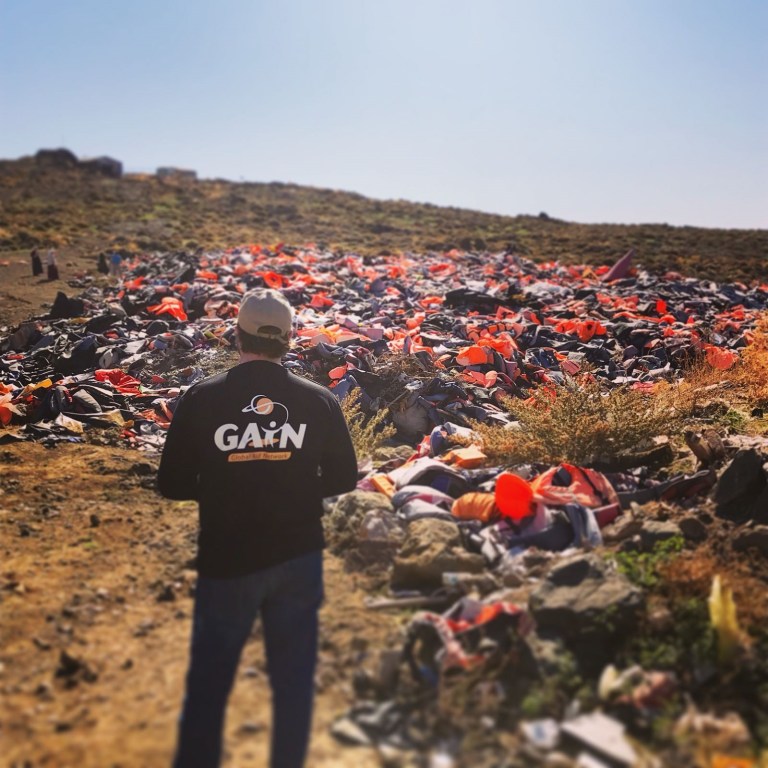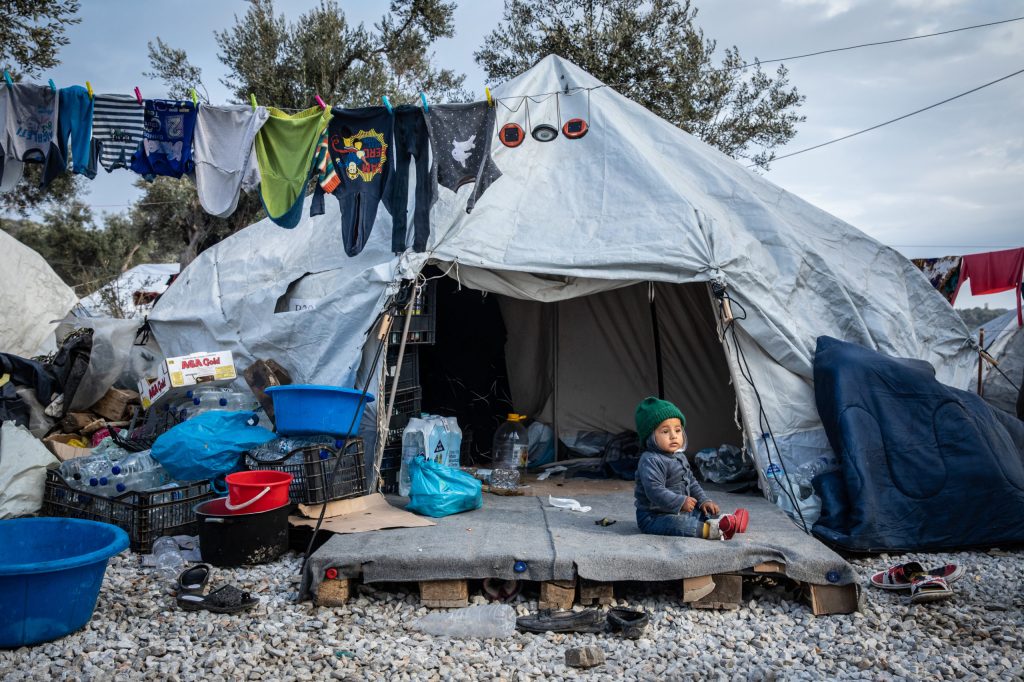As we prepared ourselves for what the press is calling “the hell of Moria”, we became more fearful as we read articles, books, saw photos and watched footage of the camp. We prayed for courage, for protection, for provision, for wisdom, for compassion….
We arrived in Lesbos to meet our team and get some informative, relevant and insightful training: a great start to meet such special, dedicated, wise people and feel safe together.
Our heads full of new information and inspiring thoughts, our hearts full of anticipation and compassion, we headed for an introductory tour of the camp before starting work the next day. We parked by the stone walls and walked past the police stationed at the entrance of the military base that was intended as a Hot Spot for 3,000 and has become, over the past 5 years, a “temporary” refuge to 20,000 people.
First Thoughts of Camp Moria
People, people everywhere! So many smiling faces and “Hello”s greeted us! Crowds of people hanging around, wire fences, gates, putrid piles of rubbish and tents everywhere with muddy flipflops left at the entrance. As we walked through the camp, small children approached us to say hello, or wanting to hold our hands.
We climbed the steep path through the centre of the camp, surprised by the hustle and bustle of street traders offering household goods and fresh fruit; the tantalising aromas of wonderful fresh hot street foods led us to the top of the camp, from where we could see the extent of the overflowing tents, right up the hillsides and into the chaos of the Jungle. This was the reality of Moria.
Our First Shift
Our first shift and the challenge was set: to stand guard at the gate of Section C and protect vulnerable women. I had no idea what this might entail. The vulnerable women of Section C are supposed to show their police papers every time they come through the gate, to ensure that no ‘visitors’ enter. This is to protect their safety, but it is a challenge in itself, as they didn’t always appreciate this. These are hurting, traumatised, exhausted people.
They have been there for months, maybe years and some of them resent the need to prove they live there. One aggressive woman refused to show me her papers. I repeatedly asked her for them but she ranted in French that the papers were in her tent / lost/ eaten by mice…until she shouted at me to ‘remember her face’ and then drew her ‘lost’ papers out of her bag with disgust/anger/ridicule. I found this a real challenge, but I realised that it said so much about how she was feeling, and I looked out for her the rest of the shift to greet her and value her.
As I stood at the gate of section C, I was joined by bored young children who would fish in the muddy puddles to find something to play with and then wander off, with no parent around to provide protection, engagement, or comfort. Often other women would step in to look after these young children, regardless of race. It was heart-warming to see motherhood cross cultural boundaries as they looked out for each other.
The Least of the Least
The women stood in long queues, jostling and shouting at each other as they waited for us to give out tickets for their fortnightly entitlement to nappies and sanitary towels, or a shower (as there was insufficient provision in camp).
We were told how many nappies/ wipes/sanitary towels each woman was allowed to have, checked against their ID and family information. Some of them pleaded for more, but we had to stand firm. The queues became unruly, with underground systems of preference and competition to get the desperately needed showers.
It was hard to say no and hard to crowd control, but it was equally an opportunity to give individual affirmative attention and ask their name, not just their number, to connect with a gentle smile …. and have a lighter moment of practising English.
The Hotspot
The military base that is now the Hot Spot for People of Concern (people who have come here seeking refuge) in Moria, was designed for a capacity of up to 3,000. There are currently 20,000 people taking ‘refuge’ there. The camp is grotesquely overcrowded, with families squeezing into unhealthy spaces, in tents, metal ‘Isoboxes’ rammed up against each other and the ever-present mountains of rubbish. The camp cannot contain them. With tents outside of the camp and covering the steep olive hills beyond, people are jostling for space, linked together with makeshift washing lines, a putrid stench and a need to leave.
The Life Jacket Graveyard

We drove an hour or so through the beautiful, rugged mountains , covered by olive trees, the sea a few metres away, with stunning views across the headland…and as we climbed and climbed and followed a dirt track, we were faced with the scene of the mass of discarded and lost life jackets , each one with a story to tell. It was an emotional experience for all of us, as we took in the reality of the significance of the treacherous journey each person had made. We sat on a rock, reflecting, praying, listening to the sheep bells across the field, with the jackets dumped before us, against the backdrop of the view of Turkey, just 5 or so miles across the water. We stopped; some of us prayed, others cried and others comforted, as we took stock of lives lost, lives threatened, lives traumatised.
News of Covid-19
On the plane home we read of the frightening outbreak of Coronavirus in Italy, alerting us to its very real danger to us in Europe. Within a fortnight of coming home, still processing the impact of our experience in Moria, we were dealing with social distancing and isolation: in the UK, where we have a house, with rooms, beds, a garden, to protect ourselves and others. We think of those people we have met in Moria. In the chaos and crowding of Moria, there is no chance of distancing, no chance of protection, no chance of prevention. It is a catastrophic crisis.
My desperate prayers cry out for these victims of terror, victims of abuse, victims of injustice.
They are now, more than ever, ‘People of Concern’.

Janna is an ESOL teacher in Birmingham and is involved with teaching and befriending refugees. Janna and her husband were motivated to join the Refugee Relief Project because they both wanted to learn more about refugee journeys and also find a way to celebrate both their 60th birthdays by serving God in a practice way.

